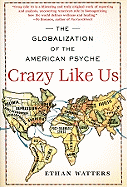
 Ethan Watters stirs up one controversy after another in this provocative study of mental illness diagnosis and treatment in cultures other than our own. In the best investigative reporting tradition, he examines the incidence and current treatment regimens for anorexia in Hong Kong, schizophrenia in Zanzibar, depression in Japan and post-traumatic stress disorder (PTSD) in Thailand, Sri Lanka and Indonesia following the tsunami of 2004.
Ethan Watters stirs up one controversy after another in this provocative study of mental illness diagnosis and treatment in cultures other than our own. In the best investigative reporting tradition, he examines the incidence and current treatment regimens for anorexia in Hong Kong, schizophrenia in Zanzibar, depression in Japan and post-traumatic stress disorder (PTSD) in Thailand, Sri Lanka and Indonesia following the tsunami of 2004.
Watters argues that we have effectively spread worldwide an idea that "mental illnesses exist apart from and unaffected by professional and public beliefs and the cultural currents of the time." This has occurred through the prevailing use of the American Psychiatric Association's Diagnostic and Statistical Manual of Mental Disorders as a basic reference tool; training of other countries' mental health professionals in the West; and drug companies' marketing campaigns that emphasize predominantly Western perspectives. In interviews, he hears again and again that mental health professionals, by ignoring important cross-cultural factors, may be doing more harm than good in many circumstances.
Watters's report on mental health practitioners arriving in Sri Lanka after the 2004 tsunami with very little understanding of the country and culture is particularly disturbing. The generally accepted Western course for effective healing from PTSD is to process the trauma experience with the help of a trained therapist. Watters views the wholesale application of Western treatments in Sri Lanka (without taking account of the culture and recent brutal 30-year-long civil war) as having been a monumental waste of energy and resources.
That well-intentioned failure is still not as disconcerting as the story Watters has to tell about GlaxoSmithKline (manufacturers of Paxil) in Japan. "The psychiatric category of depression was not a widespread public concern, and the capacity to experience great sadness was considered not a burden but a mark of strength and distinction," Watters writes of Japanese beliefs before 2000. Despite Japanese thinking to the contrary, GlaxoSmithKline saw a huge potential market for Paxil and mounted a massive marketing campaign that combined savvy marketing and questionable scientific research. That campaign eventually bulldozered cultural resistance and long-held beliefs--by 2008, GlaxoSmithKline was selling $1 billion of Paxil annually in Japan.
"The ideas we export to other cultures often have at their heart a particularly American brand of hyperintrospection and hyperindividuality... [reflecting] the Cartesian split between the mind and the body, the Freudian duality between the conscious and the unconscious," Watters notes as he implores all to carefully consider cross-cultural factors at play when storming in to treat mental illness in other countries.--John McFarland
Shelf Talker: A provocative study of American mental illness treatments that often harm, not help, people in other countries.

